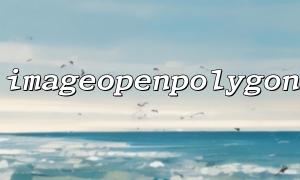When using PHP's imageopenpolygon() function to draw an open polygon, you may sometimes encounter a situation where it returns false. This usually indicates an issue with incorrect parameter passing, image resource problems, or the way the function is called. This article will start with common errors and gradually analyze possible causes and solutions, helping you quickly locate and fix the issue.
imageopenpolygon() is part of the GD graphics library. If the GD library is not correctly installed on the server, any GD functions will fail. You can check this with the following code:
<?php
if (function_exists('imageopenpolygon')) {
echo "GD library is installed and supports the imageopenpolygon() function.";
} else {
echo "GD library is not installed or does not support the imageopenpolygon() function. Please check the PHP configuration.";
}
?>If it shows that the GD library is not installed, you need to install the GD module on the server, for example, by using:
sudo apt install php-gd
After installation, remember to restart the server.
imageopenpolygon()'s first parameter must be a valid image resource. Here is a standard example of creating an image resource:
<?php
$image = imagecreatetruecolor(400, 300);
$white = imagecolorallocate($image, 255, 255, 255);
imagefill($image, 0, 0, $white);
?>If $image is not a valid image resource generated by imagecreatetruecolor(), imagecreatefromjpeg(), or similar functions, then imageopenpolygon() will return false.
imageopenpolygon()'s second parameter requires a one-dimensional coordinate array, in the form of [x1, y1, x2, y2, x3, y3, ...]. If the array format is incorrect, the function will fail.
Incorrect example (two-dimensional array):
$points = [
[10, 10],
[100, 50],
[50, 150]
];
imageopenpolygon($image, $points, 3, $color); // Incorrect
Correct example (one-dimensional array):
$points = [10, 10, 100, 50, 50, 150];
imageopenpolygon($image, $points, 3, $color);
Pay special attention to the third parameter, which represents the number of vertices, not the number of array elements. The number of vertices should be (count($points) / 2).
When drawing a polygon, you need to specify a color index, usually by using imagecolorallocate(). For example:
$color = imagecolorallocate($image, 0, 0, 0); // Black
If you pass an uninitialized color value, it will also cause the drawing to fail.
Taking into account all the above considerations, here is a complete and executable example:
<?php
// Create a blank image
$image = imagecreatetruecolor(400, 300);
<p>// Allocate colors<br>
$white = imagecolorallocate($image, 255, 255, 255);<br>
$black = imagecolorallocate($image, 0, 0, 0);</p>
<p>// Fill the background<br>
imagefill($image, 0, 0, $white);</p>
<p>// Define vertices<br>
$points = [50, 50, 150, 50, 100, 150];</p>
<p>// Draw the open polygon<br>
if (imageopenpolygon($image, $points, 3, $black)) {<br>
echo "Drawing successful!";<br>
} else {<br>
echo "Drawing failed, please check the parameters!";<br>
}</p>
<p>// Output the image to the browser<br>
header('Content-Type: image/png');<br>
imagepng($image);<br>
imagedestroy($image);<br>
?>If you want to see the actual effect, you can save the code above as draw_polygon.php and then access your server, for example:
https://m66.net/draw_polygon.php
Ensure that the PHP version supports (GD extension is included by default in PHP 7.2+ with imageopenpolygon()).
Always set the correct Content-Type header before outputting the image.
Remember to use imagedestroy() to free up memory after using the image resource.
When imageopenpolygon() returns false, it is usually caused by incorrect parameter settings or image resource issues. By following the above troubleshooting steps, you can solve 99% of the problems.















